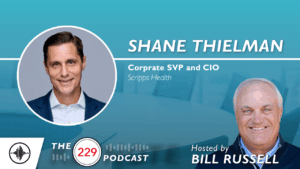

December 4, 2025

November 27, 2025

November 25, 2025
December 4, 2025
Comanche County Memorial Hospital and Southwestern Medical Center have merged to create the Memorial Health System of Southwest Oklahoma, aimed at improving healthcare access and service delivery in the region. This consolidation seeks to unify resources and expertise, enhancing the overall healthcare infrastructure for local residents. The initiative highlights a strategic commitment to providing high-quality, compassionate care and indicates a future-oriented approach to sustaining healthcare standards. As the new system rolls out its branding across platforms, it signifies a significant shift that could reshape healthcare dynamics in Southwest Oklahoma.
Comanche County and Southwestern Medical Unite to Boost Oklahoma Healthcare CCMH Health Blog
December 4, 2025
A recent Black Book Market Research survey shows that U.S. hospitals must prioritize funding in key cybersecurity domains from 2026 to 2028 to protect clinical operations and safeguard financial viability. Identity and access management emerged as the top focus, with 71% of IT leaders ranking it among their top three priorities, followed by endpoint and email security, ransomware resilience, and Zero Trust network security. As hospitals strive for maturity in these foundational areas, there remains a disparity in the faster progression of core domains versus slower advancements in cloud protection and clinical technology risks. This highlights the urgent need for healthcare organizations to enhance their cybersecurity frameworks to mitigate risks that could impact patient care and revenue.
Hospitals Prioritize Cybersecurity: Identity Management Tops 2026-2028 Agenda Newswire
December 4, 2025
Artificial intelligence (AI) is reshaping the landscape of cybercrime, making sophisticated attacks more accessible and efficient for a wider range of criminals. Recent incidents, such as the cyberattacks on the Port of Seattle, illustrate the potential risks posed by AI-enhanced threats, including deepfake scams and large-scale identity thefts. As AI lowers the barriers to entry for executing complex cyber operations, healthcare professionals must prepare for an environment where these threats can manifest rapidly and impact systems critical to patient care. The vulnerability of local agencies to the scale and velocity of these attacks underscores the urgent need for enhanced cybersecurity measures in healthcare institutions.
AI Revolutionizing Cybercrime: Unprecedented Threats Emerge in Seattle Attacks Axios
December 4, 2025
Kaiser Permanente has reached a settlement of up to $47.5 million over a class action lawsuit regarding the unauthorized sharing of patient information through tracking codes on its digital platforms. This incident, which has been classified as a HIPAA breach affecting 13.4 million individuals, highlights significant privacy violations involving sensitive data disclosure to third parties like Google and Microsoft. Although Kaiser denies any wrongdoing, the settlement aims to circumvent lengthy litigation while underlining the critical need for healthcare organizations to enhance data protection practices. The case serves as a cautionary tale, emphasizing the importance of stringent compliance with privacy laws to safeguard patient information in an increasingly digital healthcare environment.
Kaiser Settles $47.5M Lawsuit Over Massive Patient Data Breach HealthcareInfoSecurity
December 4, 2025
Comanche County Memorial Hospital and Southwestern Medical Center have merged to create the Memorial Health System of Southwest Oklahoma, aimed at improving healthcare access and service delivery in the region. This consolidation seeks to unify resources and expertise, enhancing the overall healthcare infrastructure for local residents. The initiative highlights a strategic commitment to providing high-quality, compassionate care and indicates a future-oriented approach to sustaining healthcare standards. As the new system rolls out its branding across platforms, it signifies a significant shift that could reshape healthcare dynamics in Southwest Oklahoma.
Comanche County and Southwestern Medical Unite to Boost Oklahoma Healthcare CCMH Health Blog
December 4, 2025
A recent Black Book Market Research survey shows that U.S. hospitals must prioritize funding in key cybersecurity domains from 2026 to 2028 to protect clinical operations and safeguard financial viability. Identity and access management emerged as the top focus, with 71% of IT leaders ranking it among their top three priorities, followed by endpoint and email security, ransomware resilience, and Zero Trust network security. As hospitals strive for maturity in these foundational areas, there remains a disparity in the faster progression of core domains versus slower advancements in cloud protection and clinical technology risks. This highlights the urgent need for healthcare organizations to enhance their cybersecurity frameworks to mitigate risks that could impact patient care and revenue.
Hospitals Prioritize Cybersecurity: Identity Management Tops 2026-2028 Agenda Newswire
December 4, 2025
Artificial intelligence (AI) is reshaping the landscape of cybercrime, making sophisticated attacks more accessible and efficient for a wider range of criminals. Recent incidents, such as the cyberattacks on the Port of Seattle, illustrate the potential risks posed by AI-enhanced threats, including deepfake scams and large-scale identity thefts. As AI lowers the barriers to entry for executing complex cyber operations, healthcare professionals must prepare for an environment where these threats can manifest rapidly and impact systems critical to patient care. The vulnerability of local agencies to the scale and velocity of these attacks underscores the urgent need for enhanced cybersecurity measures in healthcare institutions.
AI Revolutionizing Cybercrime: Unprecedented Threats Emerge in Seattle Attacks Axios
December 4, 2025
Kaiser Permanente has reached a settlement of up to $47.5 million over a class action lawsuit regarding the unauthorized sharing of patient information through tracking codes on its digital platforms. This incident, which has been classified as a HIPAA breach affecting 13.4 million individuals, highlights significant privacy violations involving sensitive data disclosure to third parties like Google and Microsoft. Although Kaiser denies any wrongdoing, the settlement aims to circumvent lengthy litigation while underlining the critical need for healthcare organizations to enhance data protection practices. The case serves as a cautionary tale, emphasizing the importance of stringent compliance with privacy laws to safeguard patient information in an increasingly digital healthcare environment.
Kaiser Settles $47.5M Lawsuit Over Massive Patient Data Breach HealthcareInfoSecurity

December 3, 2025

November 24, 2025

Questions about the Podcast?
Contact us with any questions, requests, or comments about the show. We love hearing your feedback.

© Copyright 2024 Health Lyrics All rights reserved